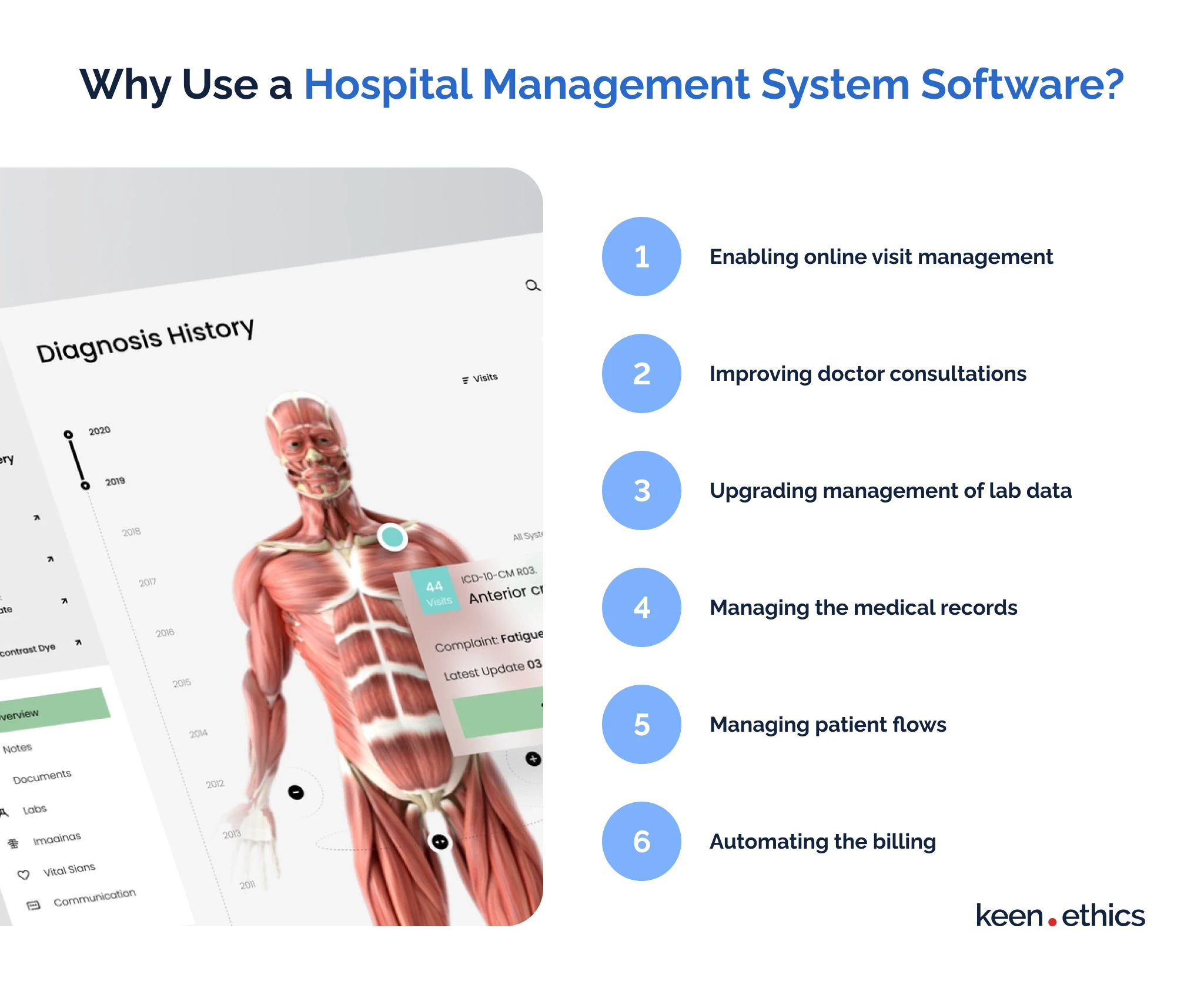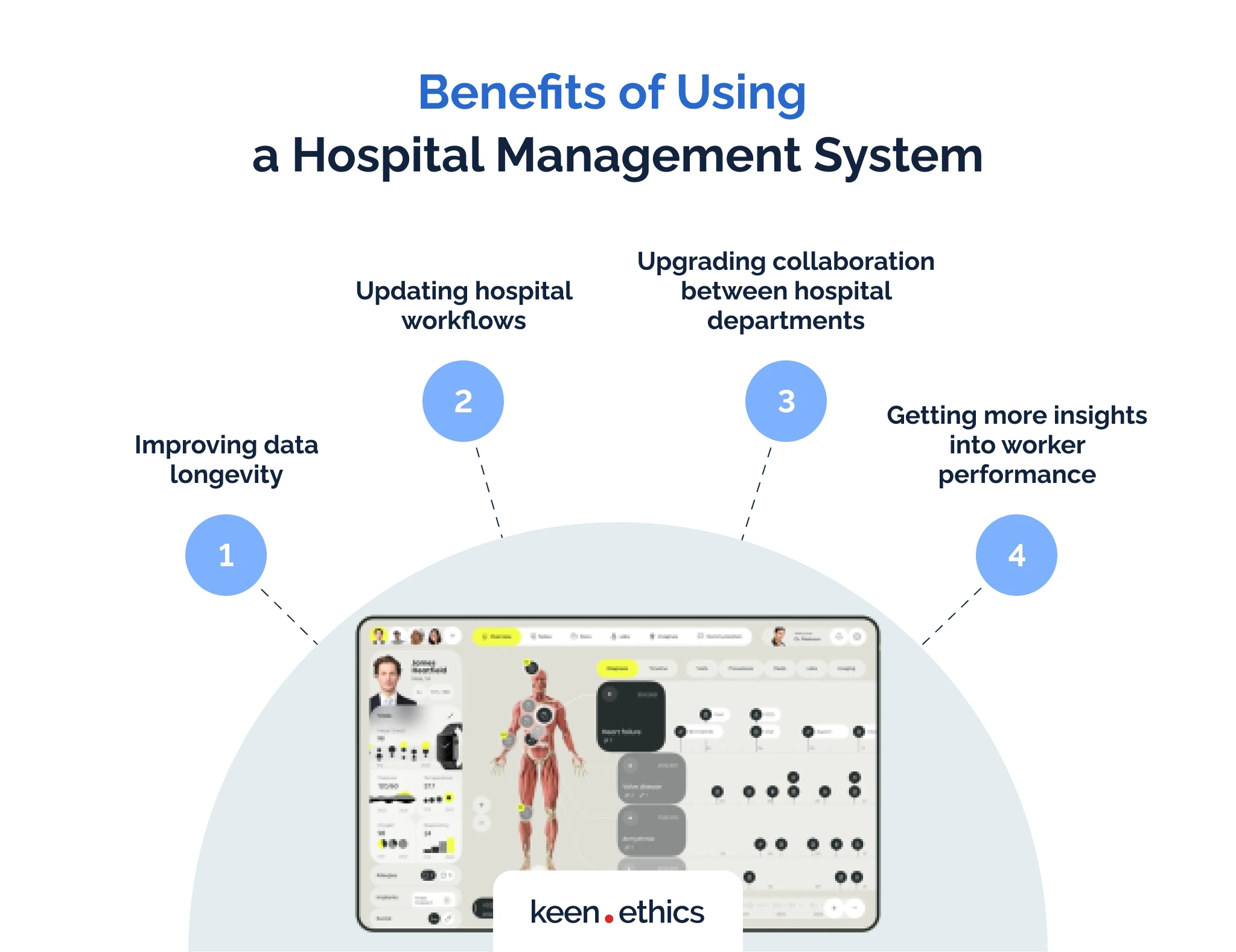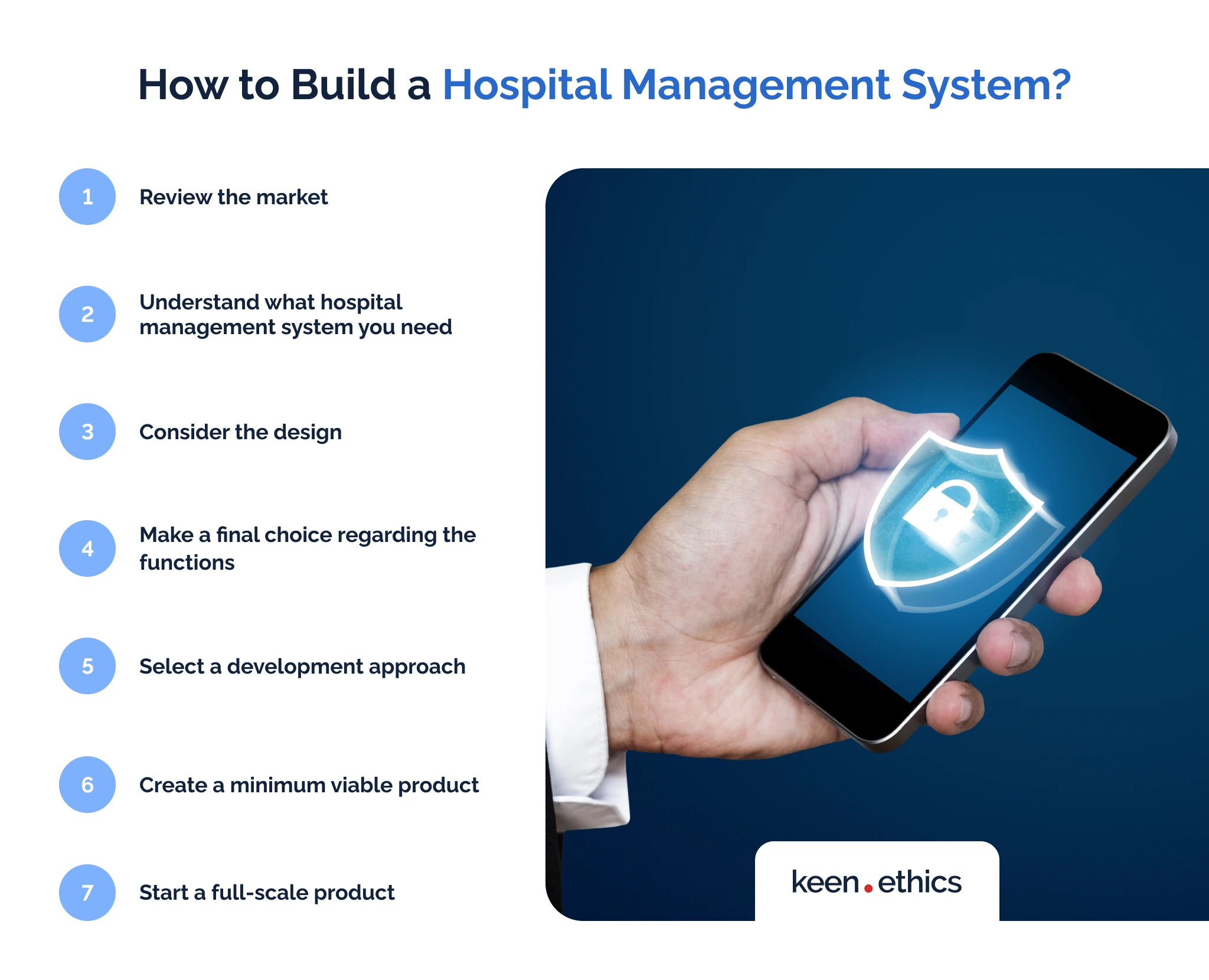Do you want to create a hospital management app? In this article, we’ll look at the key factors one needs to consider during their creation.
One of the key benefits of modern computing devices is that they greatly raise the amount of data one can analyze. This factor enables modern decision-makers to use many novel tools for improving management. In this article, we look at the hospital management software. We’ll review the definition of the presented technology and offer insight into the key reasons to use it. This material will also review the approaches necessary to build such a system and some examples of high-quality products in the sector.
What Is Healthcare Management System Software?
Hospital management software is a digital solution designed to streamline and manage various administrative and clinical tasks within healthcare organizations, according to SoftwareAdvice. It’s a comprehensive software platform that integrates and automates different aspects of healthcare operations. This framework facilitates efficient management of patient data, financial information, scheduling, billing, and other essential functions. Healthcare management system software aims to improve operational efficiency, enhance patient care, reduce errors, increase revenue, and comply with regulatory requirements. It enables healthcare providers to streamline workflows, collaborate, and deliver better health-related services.
Why Use a Hospital Management System Software?

1. Enabling online visit management
The first reason to use hospital management software (HMS) is to streamline the process of signing up for a medical review. A common inconvenience for many patients in the traditional systems is the need to visit hospitals to schedule some health checkups. HMS frameworks solve this problem once and for all: they allow people to perform this vital process from the comfort of their homes. This factor is crucial because it allows people to avoid the bureaucracy common in many organizations.
2. Improving doctor consultations
The second reason to invest in hospital management software is to improve overall consultations. How can such software help? Above all, it assists with the organized storage of key information. A doctor can review all medical records via such a system. In this way, they will be able to present better diagnoses, for example. The problems with finding high-quality information about patients are a common issue in traditional medical systems.
3. Upgrading management of lab data
Lab information has one important element: it tends to be complex. What does this mean in practice? This means managing it without computers is difficult. It’s easy to make some serious errors if one doesn’t have a tool capable of helping them manage data. In this respect, hospital management software solves the problems of medical specialists. How? It enables one to upload data about lab analysis and simplifies the review of the key information concerning the patients. A specialist may see all the vital health data in one place via such a tool.
4. Managing the medical records
Hospital management software is crucial for creating high-quality patient records. Their key characteristic is the ability to collect all the key data about a person in one place. In this light, it’s easier to present diagnoses and, generally, analyze the overall state of an individual.
5. Managing patient flows
A major problem for many hospitals is understanding who they treat. It’s easy to track people within a facility. However, out-patients are a major problem: tracking their progress is difficult. A hospital management software system solves this problem once and for all. It allows the doctors to track the people who visit their facility, preventing any data loss that can undermine the ability to deliver high-quality treatment.
6. Automating the billing
Billing is a vital process for all hospitals. It represents the key flow of funds into a relevant facility. Consistent mistakes in billing can lead to long-term losses for a hospital. In this light, a hospital management software system solves the problem. It automates the records and makes it possible to automate the billing too. All the operators would have to do is enter the information into the system, and it’ll translate the data into the bill for a patient. As Flobotics notes, this technology is perfect for streamlining the key processes in your firm.
Benefits of Using a Hospital Management System

What are the key positive outcomes of using a hospital management system? Let’s look at several key aspects in the presented case:
Improving data longevity
The first reason to use a hospital management system is to guarantee the longevity of the data. Electronic systems are much better at preserving information than any other framework. Why? A paper archive, for example, has three major problems: it’s difficult to replicate, searching data within it is a complex task, and the approach is susceptible to incidents. A fire can easily destroy the key data, and it would have no backups. In this light, HMS is a perfect framework for ensuring the stable storage of information.
Updating hospital workflows
Paper-based systems create long-term problems with finding some key data. Record-keeping is difficult for such frameworks. In this light, hospital management software is of interest because it solves this problem once and for all. With these frameworks, discovering the key information about the patients is a simple task. All one has to do is input the data about the individuals into the system, and the framework will help track the key information.
Upgrading collaboration between hospital departments
A big problem stemming from the traditional hospital records is their ‘mobility.’ It’s difficult to carry information between multiple departments. In this light, the situation can lead to large-scale losses of information. Some departments may lack information about a patient and make an incorrect decision concerning their treatment. Hospital management software resolves this problem. It offers access to a singular program that doesn’t require any physical storage. Doctors can easily review all the data from different locations in a hospital. This approach is perfect for patient cases that need multiple treatment interventions.
Getting more insights into worker performance
A big factor for any facility is understanding the productivity of the workers. It’s crucial to concentrate on training individuals who aren’t productive enough to improve the long-term productivity of a workplace. Hospital management software is perfect for this goal. Why? Such a system enables the managers to track the activities of the key workers by analyzing the key records they leave in a system. This framework is a perfect accountability tool that can ensure the long-term improvement of productivity for the workers.
Types of Hospital Management Software
Are you interested in developing high-quality hospital management software? If yes, you must understand the key types of such frameworks:
1) Electronic Health Record (EHR) Software: EHR software helps hospitals maintain digital patient records, including medical history, diagnoses, medications, and test results. It improves patient care coordination, reduces paperwork, and enables easy access to medical information for healthcare providers.
2) Hospital Information System (HIS) Software: HIS software manages various hospital operations, such as patient registration, appointment scheduling, inventory management, and billing. It enhances administrative efficiency, facilitates smooth workflows, and ensures accurate financial management within the hospital. This is software for hospital management that boosts the ability to make decisions regarding a facility.
3) Laboratory Information System (LIS) Software: LIS software is used in hospital laboratories to manage and track laboratory processes. It helps handle test orders, sample tracking, result analysis, and generating reports. LIS software improves lab efficiency, reduces errors, and enhances communication between the lab and healthcare providers.
4) Picture Archiving and Communication System (PACS) Software: PACS software is utilized for managing medical images, such as X-rays, MRIs, and CT scans, according to TechTarget. It enables the storage, retrieval, and sharing of images among healthcare professionals, ensuring quick access to diagnostic information for accurate treatment decisions. PACS software enhances collaboration and speeds up the diagnostic process
Requirements for the Hospital Management System
What are the requirements for hospital management software? Let’s look at the key features you need to consider:
- Patient Management: The system should allow easy registration of patients, scheduling appointments, and maintaining accurate and up-to-date patient records.
- Staff Management: It should give features for managing staff schedules, assigning duties, and tracking their attendance and performance.
- Billing and Financial Management: The system should handle billing processes, insurance claims, and financial transactions, ensuring accurate and timely payments.
- Inventory Management: It should enable efficient management of hospital supplies, such as medications, medical equipment, and consumables, to avoid stockouts and ensure timely procurement.
Challenges of HMS Implementation
Challenges are inherent in all things humans create. In this case, hospital management software isn’t an exception. Here are the key problems one should consider during the development of the framework:
1) Technical Challenges: Integration with existing systems, data migration, and ensuring compatibility with hardware and software infrastructure poses technical hurdles during HMS implementation.
2) User Adoption: Training and familiarizing staff with the new system, overcoming resistance to change, and ensuring smooth transition and acceptance of the HMS by users are major problems. Many people may be against the implementation of the novel system.
3) Data Security and Privacy: Implementing robust security measures to protect patient data from breaches or unauthorized access, complying with data protection regulations, and maintaining confidentiality throughout the system is also difficult. One will have to exist in the state of a perpetual ‘arms race’ with the hackers to ensure long-term stability.
4) Customization and Scalability: Tailoring the HMS to meet specific organizational needs, accommodating future growth and changes in healthcare practices, and ensuring the system’s scalability and flexibility is a final challenge. If you’re interested in developing such a system, please note our company can help deliver a high-quality custom solution for you. We have major experience in developing products such as hospital management systems software.
How to Build a Hospital Management System?

If you want to create hospital management software, it’s crucial to understand what steps one should take to deliver such a framework. Let’s look at the list of the key activities to consider:
Step 1. Review the market
The first thing to do with any project is to understand the market. Projects that don’t satisfy the needs of the customers have no value. Answer one key question: what difference can your project offer? Only if you have a good answer to this question should you proceed with the other steps.
Step 2. Understand what hospital management system you need
Different hospitals need diverging systems. Some facilities may want investment in laboratory systems. Others can seek better patient records. You should clearly define what type of framework is crucial for you: lack of clarity leads to chaos and unnecessary redesign during development. Good hospital management software has a high level of specialization.
Step 3. Consider the design
Once you understand your goals regarding the system, you should transition to the key features such a framework would have.
Look at the existing products on the market
Review the other products to understand the essence of rational design in software for hospital management.
Understand user requirements
The second thing to consider during the design phase is aligning your product with the needs of the potential customers. You should focus on the features the real customers require. The idea here is to minimize distractions concerning non-essential features.
Step 4. Make a final choice regarding the functions
With a clear understanding of the key needs and rational strategies in the market, you must make a final choice concerning the app functions. In this regard, we recommend creating clear sketches of the app interface and providing detailed outlines of the features within the relevant software.
Step 5. Select a development approach
Understanding what approach you should take regarding the overall development process is a big factor in creating any app. The most popular framework is Agile. Its iteration-centric approach allows maximum flexibility in development. If you’re sure about the features to include, however, we can also recommend the usage of Waterfall in development.
Step 6. Create a minimum viable product
A big mistake for many developers is the focus on immediate releases. You may have a great idea on paper, but there’s a major problem: the customers can have a different opinion. A minimum viable product is a sanity test. You develop a minimum version of your app to see if it makes sense from the standpoint of the market. This approach will help you find all the key weaknesses in the relevant hospital management software, improving the product’s longevity.
Step 7. Start a full-scale product
After testing your app, the last step is simple: launching the project. All you have to do afterward is maintain it and add vital customer features.
How Much Does Building a Hospital Management System Cost?
One should prepare for major expenditures to build a software hospital management system. We can’t tell how much your specific project will cost. Everything depends on the scope and complexity of the features. What we can tell, however, is the price of the developer’s labor per hour in our firm. In this case, you can expect prices between 25 and 50 dollars. If you want a free estimate of the project costs in our firm, you can find it here.
Best Hospital Management Software in 2023
Do you want to know more about the most potent examples of hospital management software on the market? It’s a perfect way to find out how to develop a hospital management system. Here is an outline of the vital hospital management software system examples:
Smartsheet
Smartsheet is a versatile organization management system that enables project and task management, collaboration, and data tracking. It offers customizable templates, automated workflows, and real-time updates, making it a valuable tool for managing hospital projects and processes.
PolicyManager
PolicyManager is a hospital management software system designed for potent policy and procedure management. It provides a centralized platform for creating, reviewing, and distributing policies, ensuring compliance, and streamlining the policy lifecycle within the healthcare organization.
MEDHOST
MEDHOST is a comprehensive hospital management systems software that offers solutions for EHR, patient management, and revenue cycle management. It focuses on improving patient care, optimizing workflows, and enhancing financial performance through integrated and user-friendly features.
Aarogya
Aarogya is an all-in-one hospital management software that includes modules for EHR, pharmacy management, appointment scheduling, and billing. It caters to the specific needs of small to medium-sized healthcare facilities, providing a cost-effective solution for streamlining operations and improving patient care.
Paragon
Paragon is a robust hospital management software by Allscripts, offering integrated solutions for EHR, revenue cycle management, and clinical documentation. It helps maintain interoperability, clinical decision support, and patient engagement, empowering hospitals to deliver high-quality, coordinated care across various departments and specialties.
McKesson HMS
McKesson’s hospital management software combines EHR, revenue cycle management, and supply chain management capabilities. It emphasizes interoperability, data analytics, and operational efficiency to support healthcare organizations in delivering high-quality care.
eClinicalWorks
eClinicalWorks offers a comprehensive hospital management system with modules for EHR, practice management, and revenue cycle management. It emphasizes patient-centered care, care coordination, and population health management, empowering healthcare providers to deliver value-based care.
Athenahealth
Athenahealth’s hospital management software enhances revenue cycle management, patient engagement, and interoperability. It offers features for EHR, practice management, and patient communication, enabling streamlined workflows and improved financial outcomes.
Siemens Healthineers
Siemens Healthineers provides a hospital management system that integrates EHR, radiology information system, and laboratory information system functionalities. It promotes seamless data exchange, clinical decision support, and strong diagnostic processes for better patient care.
GE Healthcare
GE Healthcare offers a robust hospital management software solution encompassing EHR, revenue cycle management, and imaging management capabilities. It emphasizes clinical efficiency, data analytics, and interoperability to enhance patient outcomes and operational performance.
Conclusion
The idea of developing a hospital management system is a rational choice. We hope this article has helped you understand how to create a high-quality system. Are you interested in developing hospital management software? In this case, we recommend contacting our firm. Our company has multiple years of experience in developing software for medical organizations. You can look at the portfolio here.
Common Questions About Hospital Management Software
Why should we use medical software?
Using medical software improves efficiency, accuracy, and organization in healthcare processes. It enhances patient care, streamlines workflows, and enables better data management and analysis.
What software systems are used in hospitals?
Hospitals use various software systems such as Electronic Health Records (EHR), Hospital Information Systems (HIS), Picture Archiving and Communication Systems (PACS), and Laboratory Information Systems (LIS).
What are the key problems of hospital management systems?
Some key problems of hospital management systems include data security and privacy, interoperability issues, user adoption challenges, and technical complexities.
Are you interested? Then, don’t hesitate to contact our firm. We’re ready to offer you an estimate of your project and assist with developing a high-quality product.

























